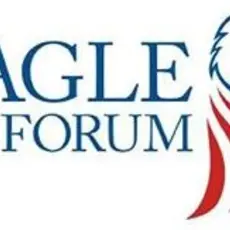Yesterday on Eagle Forum Live, Phyllis Schlafly’s guest host Bill Borst and author J. R. Dunn discussed how liberalism is responsible for millions upon millions of deaths throughout the world and that because of the election of Barack Obama, the lethal ideology is going to take over America. Dunn was promoting his book “Death by Liberalism,” arguing that Rachel Carson, one of the forerunners of the modern environmental movement who has been demonized by the chemical industry, is “one of the few people along with Karl Marx who’s responsible for millions of deaths by writing a book alone.” Dunn and Borst agreed that liberals have no problem with the millions of people supposedly dying from their policies because it is simply “collateral damage”:
Borst: And they don’t seem to get bothered by that, it’s sort of like collateral damage in a war?
Dunn: It doesn’t impact. You can even bring this up to them and it’s kind of a shrug, like, so what?
Borst: Right, they treat life, you said, ‘malleable,’ right. I don’t think they really think people are important. It’s a form of socialism, that people exist for the good of the state, am I right?
Dunn: I would say so, it’s not even so much the state as for the good of the idea, liberalism has to survive. Everything else can go out the window.
Borst: You talk about Rachel Carlson in your book and ‘Silent Spring,’ I think that woman probably has more blood on her hands that any woman I can name, do you agree with that?
Dunn: The way I put it in the book is that she’s one of the few people along with Karl Marx who’s responsible for millions of deaths by writing a book alone.
Borst: Americans are taught not to judge, right? Does that help liberalism? Does that help advance the liberal cause? In other words, we’re taught not to search for motivations, don’t judge motivations
Dunn: I would say it does.
Borst: See what I’m working I think these people know exactly what they’re doing, I think they know people will die, and as you said before I think they’re very cavalier and don’t really care.
Dunn: Collateral damage.
Borst: Exactly.
Dunn: Collateral damage. It’s something we can live with. One of the saying that they like that they don’t speak too loudly in public is, ‘you can’t make an omelet without breaking a few eggs.’
Borst: So I guess my point is, have we crossed that line? With these people working actively.
Dunn: That’s a good question. That’s one thing that we wouldn’t find out about until its twenty years on.





